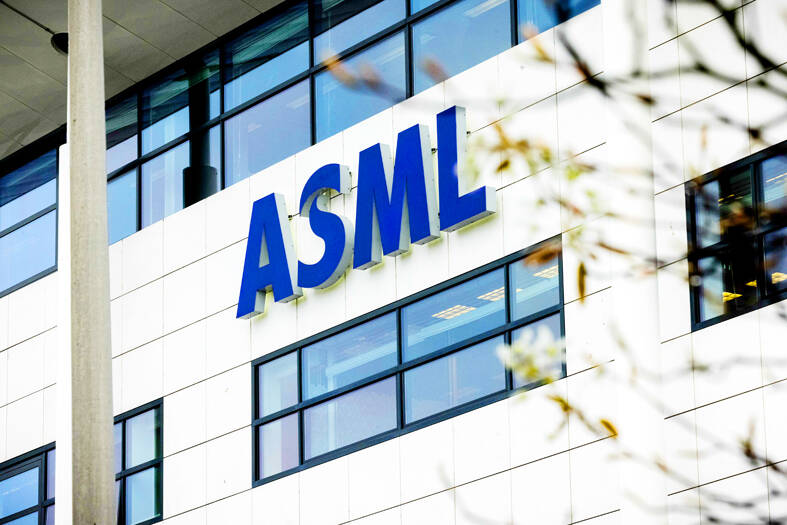ASML Holding NV shares fell as the prospect of more severe US restrictions on its business in China offset growth in the Dutch firm’s order intake last quarter.
The US is targeting ASML, which has a monopoly on making the machines that produce the most advanced semiconductors, as it ratchets up pressure to stem Chinese advances in the semiconductor industry.
The shares fell even as the company reported that bookings rose 54 percent in the second quarter from the previous three months to 5.57 billion euros (US$6.09 billion), beating estimates.

Photo: EPA-EFE
“The geopolitical angle, however, is likely to be in more focus today than results, with Bloomberg reporting the US is pressing for additional restrictions on ASML,” Citi analyst Andrew Gardiner said in a note. “Pressure is building to restrict service activity on the installed base.”
ASML shares dropped as much as 7.7 percent to 903 euros in Amsterdam, the most since October 2022.
ASML expects sales in the current quarter of between 6.7 billion euros and 7.3 billion euros. The company confirmed previous guidance of flat sales this year before returning to strong growth next year.
Previous US-led chip measures targeting ASML’s exports to China did not dent demand from the Asian nation.
China accounted for nearly half of ASML’s revenue in the second quarter, and sales to the Asian nation rose by 21 percent from the previous quarter. Beijing has been buying up unrestricted older kit to make more mature types of semiconductors.
ASML is increasingly driven by demand for high-powered chips needed for artificial intelligence (AI) applications.
“We currently see strong developments in AI, driving most of the industry recovery and growth, ahead of other market segments,” ASML chief executive officer Christophe Fouquet said in a statement.
Impressive results from some of ASML’s biggest customers helped support demand for the company’s equipment. Taiwan Semiconductor Manufacturing Co (台積電) last week said that its second-quarter sales grew at their fastest pace since 2022, buoyed by the AI boom that is fueling data center investment worldwide.
Sales to Taiwan rose by 290 million euros in the quarter as demand for advanced equipment inched up, it said.
Last quarter was ASML’s first under Fouquet, who took over when Peter Wennink retired in April. He has been trying to balance a US push to tighten export controls for China with the need to continue to sell equipment in the company’s biggest market.
US pressure to slow Beijing’s advances in making semiconductors led the Netherlands to ban exports to China of ASML’s second-most advanced category of machinery, immersion deep ultraviolet lithography machines, at the start of the year.
However, ASML continues to service machines that were bought before the restrictions were in place. The administration of US President Joe Biden has told allies that it is considering using the foreign direct product rule, which lets the US impose controls on foreign-made products that use even the tiniest amount of US technology, if such practices continue.
The company has said as much as 15 percent of sales in China this year would be affected by the export control rules imposed in January.
ASML has never been allowed to sell its most-advanced extreme ultraviolet technology to China.

Semiconductor business between Taiwan and the US is a “win-win” model for both sides given the high level of complementarity, the government said yesterday responding to tariff threats from US President Donald Trump. Home to the world’s largest contract chipmaker, Taiwan Semiconductor Manufacturing Co (TSMC, 台積電), Taiwan is a key link in the global technology supply chain for companies such as Apple Inc and Nvidia Corp. Trump said on Monday he plans to impose tariffs on imported chips, pharmaceuticals and steel in an effort to get the producers to make them in the US. “Taiwan and the US semiconductor and other technology industries

SMALL AND EFFICIENT: The Chinese AI app’s initial success has spurred worries in the US that its tech giants’ massive AI spending needs re-evaluation, a market strategist said Chinese artificial intelligence (AI) start-up DeepSeek’s (深度求索) eponymous AI assistant rocketed to the top of Apple Inc’s iPhone download charts, stirring doubts in Silicon Valley about the strength of the US’ technological dominance. The app’s underlying AI model is widely seen as competitive with OpenAI and Meta Platforms Inc’s latest. Its claim that it cost much less to train and develop triggered share moves across Asia’s supply chain. Chinese tech firms linked to DeepSeek, such as Iflytek Co (科大訊飛), surged yesterday, while chipmaking tool makers like Advantest Corp slumped on the potential threat to demand for Nvidia Corp’s AI accelerators. US stock

The US Federal Reserve is expected to announce a pause in rate cuts on Wednesday, as policymakers look to continue tackling inflation under close and vocal scrutiny from US President Donald Trump. The Fed cut its key lending rate by a full percentage point in the final four months of last year and indicated it would move more cautiously going forward amid an uptick in inflation away from its long-term target of 2 percent. “I think they will do nothing, and I think they should do nothing,” Federal Reserve Bank of St Louis former president Jim Bullard said. “I think the

SUBSIDIES: The nominee for commerce secretary indicated the Trump administration wants to put its stamp on the plan, but not unravel it entirely US President Donald Trump’s pick to lead the agency in charge of a US$52 billion semiconductor subsidy program declined to give it unqualified support, raising questions about the disbursement of funds to companies like Intel Corp and Taiwan Semiconductor Manufacturing Co (台積電). “I can’t say that I can honor something I haven’t read,” Howard Lutnick, Trump’s nominee for commerce secretary, said of the binding CHIPS and Science Act awards in a confirmation hearing on Wednesday. “To the extent monies have been disbursed, I would commit to rigorously enforcing documents that have been signed by those companies to make sure we get